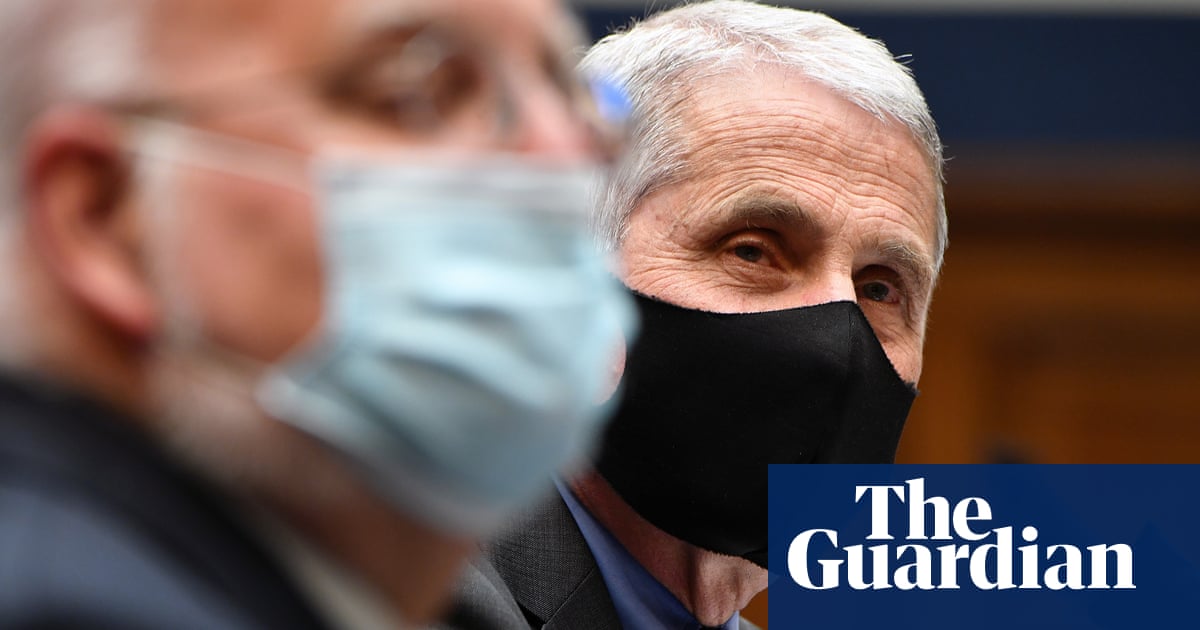
Top US infectious disease expert disputes Trump’s comments in congressional testimony and warns of ‘disturbing surge’
The US’s top infectious disease expert has testified before Congress that the country will be doing more Covid-19 testing, not less, hours after Donald Trump insisted he was serious when he called for testing to slowdown in the US.
Coronavirus cases have continued to rise in about half of US states, but Trump said at a weekend rally in Tulsa, Oklahoma, that increased testing was making the US look bad and that he had asked staff to slow down. His press secretary had later said the remarks were “in jest” but the president stood by them on Tuesday, telling reporters that the comments weren’t a joke.
Speaking to a congressional committee hours later, however, Dr Anthony Fauci said: “I know for sure that to my knowledge none of us have ever been told to slow down on testing. That just is a fact. In fact, we will be doing more testing.”
Fauci, a member of the White House coronavirus task force, spoke to the committee alongside the heads of the Centers for Disease Control and Prevention, the Food and Drug Administration and a top official at the Department of Health and Human Services.
About 2.3 million Americans have been sickened in the pandemic, and some 120,000 have died, according to data from Johns Hopkins University.
Fauci last testified before Congress in May, when states were still mostly shut down. Since then staggered re-openings have taken place across the country, and several states are seeing a concerning increase in cases.
He said the state of coronavirus in the US was overall a “mixed bag,” in part because of the country’s huge size and diversity.
He said some areas, such as New York City, had done well to rein in cases by following the government’s guidelines for re-opening, but said the “disturbing surge” in infections in other parts of the country was very concerning.
“The next couple of weeks are going to be critical to address those surges we’re seeing,” Fauci said, specifically citing the increase in cases in Florida, Arizona and Texas.
He was joined by House Energy and Commerce Committee by CDC director Dr Robert Redfield, FDA chief Dr Stephen Hahn and the head of the US Public Health Service, Admiral Brett Giroir.
The concerns shared by top health leaders at the hearing contradicted Trump’s continued efforts to downplay the affects of Covid-19.
At least eight Trump campaign staffers tested positive for Covid-19 in Tulsa, where Trump told a campaign rally that he had asked administration officials to slow down testing, because too many positive cases are turning up.
After administration figures including White House press secretary Kayleigh McEnany suggested the comments weren’t serious or were a joke, Trump on Tuesday said: “I never kid.”
“Testing is a double-edged sword,” Trump told reporters. “One way, it shows you have cases and in another way you find out where the cases are and you do a good job.”
When asked individually at the congressional hearing if the president had asked the US health leaders to slow down testing, they all responded “no.”
At the time of the May hearing, Fauci was one of many speakers to testify from a video feed at home. This time, the speakers were in person for this hearing, though most congressional representatives relied on video feeds to ask questions.
In the chamber, the men sat with tubs of disinfectant wipes and hand sanitizer pumps next to their nameplates. While committee members and speakers are usually packed tight, people sat at a distance, wearings masks which they removed to speak.
Fauci told the committee he was “cautiously optimistic” that a vaccine would be ready at the end of the year or early 2021. He said phase three of vaccine testing is to begin next month.
The group also expressed concern about what could happen if coronavirus cases are still high when flu season arrives in the autumn.
In a prepared statement, the experts said such a collision could again burden the country’s healthcare system.
“If there is Covid-19 and flu activity at the same time, this could place a tremendous burden on the healthcare system related to bed occupancy, laboratory testing needs, personal protective equipment and healthcare worker safety,” the statement said.
There is still no vaccine for Covid-19, and there are no treatments specifically developed for the disease, although the antiviral drug remdesivir has been shown to help some patients, as well as a steroid called dexamethasone, and plasma from patients who have recovered.
Since Fauci last testified, hospital physicians have become more skilled in treating coronavirus patients with the techniques and medications at their disposal. The US continues to ramp up testing, with some 27.5 million Americans, or more than 8% of the population, tested thus far. But most communities still lack enough health workers trained in doing contact tracing, the work of identifying people who have had interactions with an infected person. That could make it more difficult to tamp down emerging outbreaks.
Fauci remains optimistic that a vaccine will be found, noting that patients develop antibodies to the virus – a sign that the human immune system is able to battle back. However, he shies away from promising results by the end of the year, as Trump has done.
The energy and commerce panel has oversight over drugs and vaccines, among other facets of the US healthcare system. Committee Democrats have been harshly critical of the administration.
However, not all Republicans have lined up to defend the White House. Some GOP members were growing concerned early in the year that the administration wasn’t doing enough to prepare.
Associated Press contributed to this report



